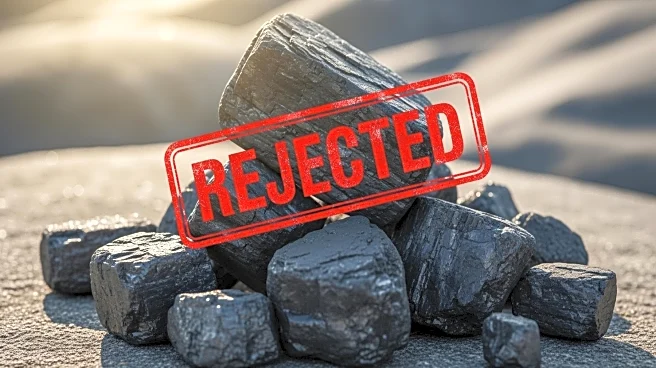What's Happening?
Federal officials have rejected a bid from the Navajo Transitional Energy Co. (NTEC) to acquire 167 million tons of coal on public lands in Montana for less than a penny per ton. This decision marks what
would have been the largest U.S. government coal sale in over a decade. The Department of Interior stated that the $186,000 bid did not meet the requirements of the Mineral Leasing Act, which mandates bids to be at or above fair market value. The last successful lease sale in the region saw Peabody Energy pay $793 million for 721 million tons of coal in Wyoming. The rejection highlights the declining demand for coal as utilities increasingly turn to natural gas and renewable energy sources.
Why It's Important?
The rejection of the coal lease bid underscores the ongoing shift in the energy sector away from coal, driven by economic and environmental factors. Despite President Trump's efforts to revive the coal industry, the market continues to favor cleaner energy sources. This decision reflects broader trends in energy policy under President Biden's administration, which aims to reduce coal sales due to climate change concerns. The outcome affects stakeholders such as NTEC, which is owned by the Navajo Nation, and could impact their economic strategies, particularly as domestic demand for coal decreases and power plants plan to phase out coal usage.
What's Next?
The future of coal sales in the Powder River Basin remains uncertain, with the Department of Interior not specifying if the Montana sale will be rescheduled. A second proposed lease sale in Wyoming was postponed following the low bid in Montana, and its rescheduling is yet to be announced. NTEC may need to explore alternative markets, such as increasing coal exports to Asia, although previous attempts have been hindered by limited port capacity. The broader implications for the coal industry include potential shifts in employment and economic strategies for regions dependent on coal mining.
Beyond the Headlines
The rejection of the coal lease bid raises questions about the long-term viability of coal as an energy source in the U.S. The decision reflects a growing recognition of the environmental impact of coal emissions, which contribute to climate change. This shift may lead to increased investment in renewable energy infrastructure and technology, potentially transforming the energy landscape and influencing policy decisions at both state and federal levels.










